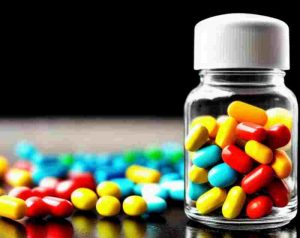Self-Medication and Substance use Disorder.
Caught Up in a Self Destructive Cycle?
It’s not always easy to identify when you’re self-medicating. After all, drinking alcohol is a socially acceptable part of many cultures, prescription medications can be found in most bathroom cabinets, and even recreational drugs such as marijuana are now legal or easy to obtain in a lot of places.
If you are concerned about some of your “escaping” habits, it’s necessary to examine your motives for drinking or taking drugs, as well as the impact it’s having on your life. For example, are you popping a pain pill because your back is hurting or because you’ve had a stressful day at work, and you want to change how you feel? Are you having a drink to be sociable with friends or complement a meal, or are you trying to improve your mood or feel less anxious? Have you been through a traumatic experience and found yourself wanting to dissociate from yourself? Numbing your emotional pain and emotions?

Which of the following blocks can you tick for signs that you might be self-medicating?
- Do you turn to alcohol or drugs when you’re feeling anxious, stressed, or depressed? Many of us have used substances to cope with occasional bad news, such as the loss of a job or the breakup of a relationship. But if you’re regularly drinking or using drugs to cope with stress, relieve boredom, improve how you feel, or steel yourself for a social engagement, for example, then there’s a strong possibility you’re self-medicating.
- It takes more and more self-medicating to gain relief. Where once it took just one or two drinks to ease your anxiety or de-stress at the end of the day, now it takes three, four, or even more. Having an increased tolerance means that you need more alcohol or drugs to experience the same effects. As you continue to self-medicate, your tolerance will continue to increase—as will the problems caused by your increasing substance use. You can only break the cycle by finding healthier ways to deal with your problems.
- Your problems are multiplying. You started drinking to cope with stress, for example, but now you’ve got health, relationship, and financial problems to cope with as well. And the stress is even worse. The more you self-medicate, the more problems it creates in your life.
- You worry when you don’t have access to drugs or alcohol. Do you worry about how you’ll cope with a social situation where alcohol won’t be available? Do you start to get anxious when your prescription runs out? Do you get restless waiting for payday so you can afford to restock the drinks cabinet or call your dealer? The more uncomfortable you get at the thought of being separated from your substance of choice, the more likely it is that you’re self-medicating.
- Your friends and family are worried about your substance use. Have people who care about you expressed their concern that you seem to be drinking more than usual? Or perhaps they’ve noted the changes in your personality, behavior, or social life? Substance abuse can affect those around you just as much as it affects you. It’s easy to dismiss others’ concerns or pretend that everything’s okay. But it takes great strength to listen to your loved ones’ fears and recognize when your substance use has become a problem.
It’s important to remember that seeking help and admitting that you struggle is a sign of strength, not weakness.
Whatever problems you’re facing; there are effective ways to cope and take back control of your life. There are trained professionals who are dedicated to helping individuals overcome these difficulties and lead healthier, more fulfilling lives.
When you delay in seeking help it can become more challenging to change direction and seek healthier, more effective methods of dealing with your problems. Once you recognize how your substance use is only adding to your problems rather than solving them, though, you can move on to tackling the issues once and for all. Trying to self-medicate a mental health issue can worsen existing symptoms or even generate new symptoms. Abusing alcohol or drugs can interact with any other medications you’re taking, either negating their effectiveness or causing unpleasant side effects.
If you’re already at risk for a mental health disorder, drinking heavily or using drugs could lead to the development of new problems—beyond those that prompted your self-medication in the first place. For example, opioid and alcohol use has been linked with triggering depression, and marijuana and methamphetamine use with psychosis.
Denial can also occur in mental health issues. You may feel ashamed to admit that you’re struggling to cope with symptoms of depression or anxiety, for example. While it can seem easier to ignore your problems and hope they go away, overcoming denial is the first step to recovery.
Whatever problems you’re facing; there are effective ways to cope and take back control of your own life! Many people nowadays, struggle with self-medication and substance use challenges, and there are trained professionals who are dedicated to helping individuals overcome these difficulties and lead healthier, more fulfilling lives.
Knowing that it is challenging to break a circle.
Knowing that it is challenging to break a circle, support from therapists and counsellors can provide you with strategies and tools to interrupt this cycle and develop healthier lifestyle habits.
Dealing with substance use challenges can be emotionally taxing. Psychological support offers a space where you can express your feelings, fears, and frustrations without judgment.
Psychological support takes a holistic approach to your well-being. It considers not only your substance use but also your mental, emotional, and social health. This comprehensive approach is essential for long-term recovery.
Therapy can help you identify the triggers that lead to self-medication or substance use, allowing you to develop healthier ways of coping with stress, anxiety, and other emotional challenges.
Psychological support can equip you with relapse prevention strategies, helping you maintain sobriety and make healthier choices.
Addressing underlying mental health issues can significantly improve your overall well-being and quality of life.
Substance use challenges often require ongoing support and maintenance. Psychological support can provide the tools and guidance needed for sustained recovery.
Whatever problems you’re facing; there are effective ways to cope and take back control of your life.
Please reach out to us if you need help:
Dr Leonora de Villiers
Psychologist
082 497 3765
ljdevilliers@psybase.co.za
Me Gerda Vorster
Psychologist Addiction Counsellor
082 552 1781
vorgerda@gmail.com
Constantia Netcare Day Clinic
374 Ontdekkers Road
Roodepoort

